It was on a cold and wet winter’s day that I discovered Lexicography in Lichfield. By the time I had left I felt a warm affection for Lichfield. I still can’t believe that I have found another cathedral city. I thought I had visited most of them already, but Lexicogrpahy in Lichfield is another one to add to that list.
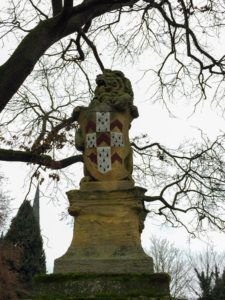
The term ‘city’ is a word we associate with large metropolitan monstrosities like Birmingham or Southampton, but England’s unique history allows for some truly interesting places to be called a city. How can a city with 10% of the required population for modern towns applying for city status be called a city?? A quick tour of Lichfield is just that. It is obvious to realise that it’s not very big but for a couple of centuries it had something its more illustrious neighbour didn’t have. When Henry VIII redrew the religious map, Lichfield was one of six towns which was given city status based on it having a cathedral. It now sits in the shadows of England’s second city Birmingham; whose growth and wealth meant its population of well in excess of 300,000 would ensure it was given city status. By the way, this rule was brought in by King Edward VII. Now hidden by its noisy neighbour it further illustrates the decline in religious power conceding it to that of commercial and population factors. Surely it is for this reason that the very existence of this charming place is known by only few people. I certainly knew nothing of it until I discovered it on a work trip and as part of my mission to visit every city in England.
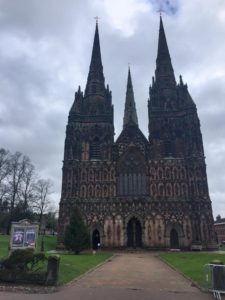
The city itself has some interesting history associated with it. Once a prominent pilgrimage site, it was laid to siege three times during the civil war and is the birthplace of Dr Samuel Johnson. More on the cathedral and the good doctor later, but Dr Johnson claimed that Lichfield was a city of philosophers!!
Lichfield was founded around 600AD. There is some evidence to suggest that this was a trading post for the Romans on their way from London to Chester. Evidence is scarce for this hypothesis. St Chad later in the same century set up his bishop’s seat here. This led to it becoming a focal point of Christianity in the Kingdom of Mercia. Mercia was one of 7 Anglo-Saxon kingdoms in the country and along with Wessex and Northumberland was considered to be in the top three. It is argued that its capital, Tamworth, was the capital of the whole of England at a time. As a result of its high profile the town of Lichfield becoming a pilgrimage site as the remains of St Chad were buried here.
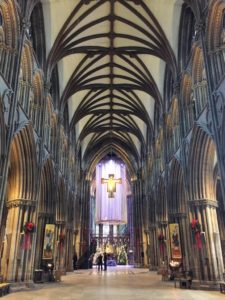
When the Norman’s took over the rule of this country, they commissioned a Norman cathedral to be built at the site. This cathedral would evolve over the years and would appear to have been a fortification as much as a place of worship! It took over 150 years to build and is apparently one of England’s smallest. This is always hard to gauge when you visit these places. The vast size of them is awe inspiring and one dares to think about how on earth they were ever built. Walking around the cathedral you notice that the spire looks hollow. Perhaps it fell down and an alternative was put in its place. The front façade is captivating. There are 113 figurines that have been carved in stone. The people represented are a mixture of kings of the lands to bishops most of whom I had never heard. A visit inside this huge space makes you feel very small in such a vacuum. Henry VIII of course had to have his say – he removed the shrine to St Chad. Some of the relics destined for destruction at that time were preserved and can be found in nearby St Chad’s in Birmingham. Upon leaving the cathedral and directly opposite it is ‘the close’ which is a collection of old cottages. The cathedral is on a slight hill and it was no doubt built here as the higher ground was chosen to build a stronghold to wave off attacks. The town was loyal to the king during the civil war. The town had been a staging post since Roman times, so was of importance for conveyance of troops and supplies. The hardships of the war were evident. By now Lichfield had become a city and one that was fought over and bruised. The cathedral itself was no different. Throughout its long history it has changed hands more than once. Lichfield’s troubles during the Civil War were exacerbated by the fact that the people were loyal to parliament and the authorities loyal to the king. A visit to the cathedral is fascinating as tales are shared with rumours of shots being fired from the spire and evidence of damage to the spire by way of shots fired in retaliation.
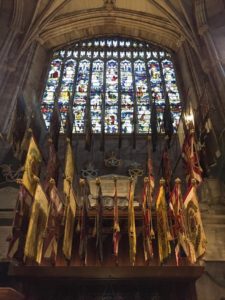
I finally managed to drag myself away and make my way into the small city centre. At its heart is the guildhall which is now a library.
It was next door to the guildhall that I discovered a fascinating museum. The rain was pouring down now and heavier than previously making a tour of unpleasant. I was looking for some respite and the mention of free entry on the sign enticed me in. Lichfield is the birthplace of Dr Samuel Johnson. To my shame, I knew nothing of this man. The grade 1 listed building was a trader’s townhouse but is now a museum dedicated to the great man. In 1777 he had this to say, “Why, Sir, you find no man, at all intellectual, who is willing to leave London. No, Sir, when a man is tired of London, he is tired of life; for there is in London all that life can afford.”
A pleasant man provided an enthusiastic welcome and I was in!! An informative video along with many information display boards meant for an educational visit as I learnt what a lexicographer is. Lexicography is the compiling of dictionaries.
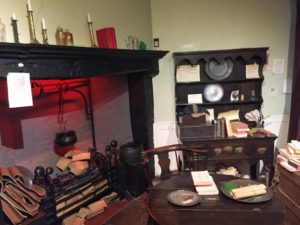
The doctor was the son of an impoverished bookseller before he made his way to London to make his fame and fortune. Before he made that trip to London, he took on the role of a teacher. One of his pupils, David Garrick, was to go on and become one of the leading actors of that time. The theatre in the town is named after him I believe. The doctor made many other memorable sayings. There was one in particular that stood out and was quoted on the wall, “You can never be wise unless you love reading”. I will admit to never have loved either reading or wanting to be wise, but, in a depressing modern world, inspiration has to be taken from these philosophical words. I must make another visit sometime for further inspiration.
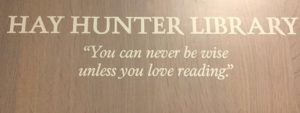
So as my time in ‘Lexicography in Lichfield’ draws to a close and further travels have to be made, I leave with this thought taken from a conversation the doctor had with James Boswell (he wrote his biography – it is said to be greatest in the land and surely something to add to my reading list), “I lately took my friend Boswell and showed him genuine civilised life in an English provincial town. I turned him loose at Lichfield.” What a sensible and profitable thing to do.
Lichfield, England, United Kingdom

